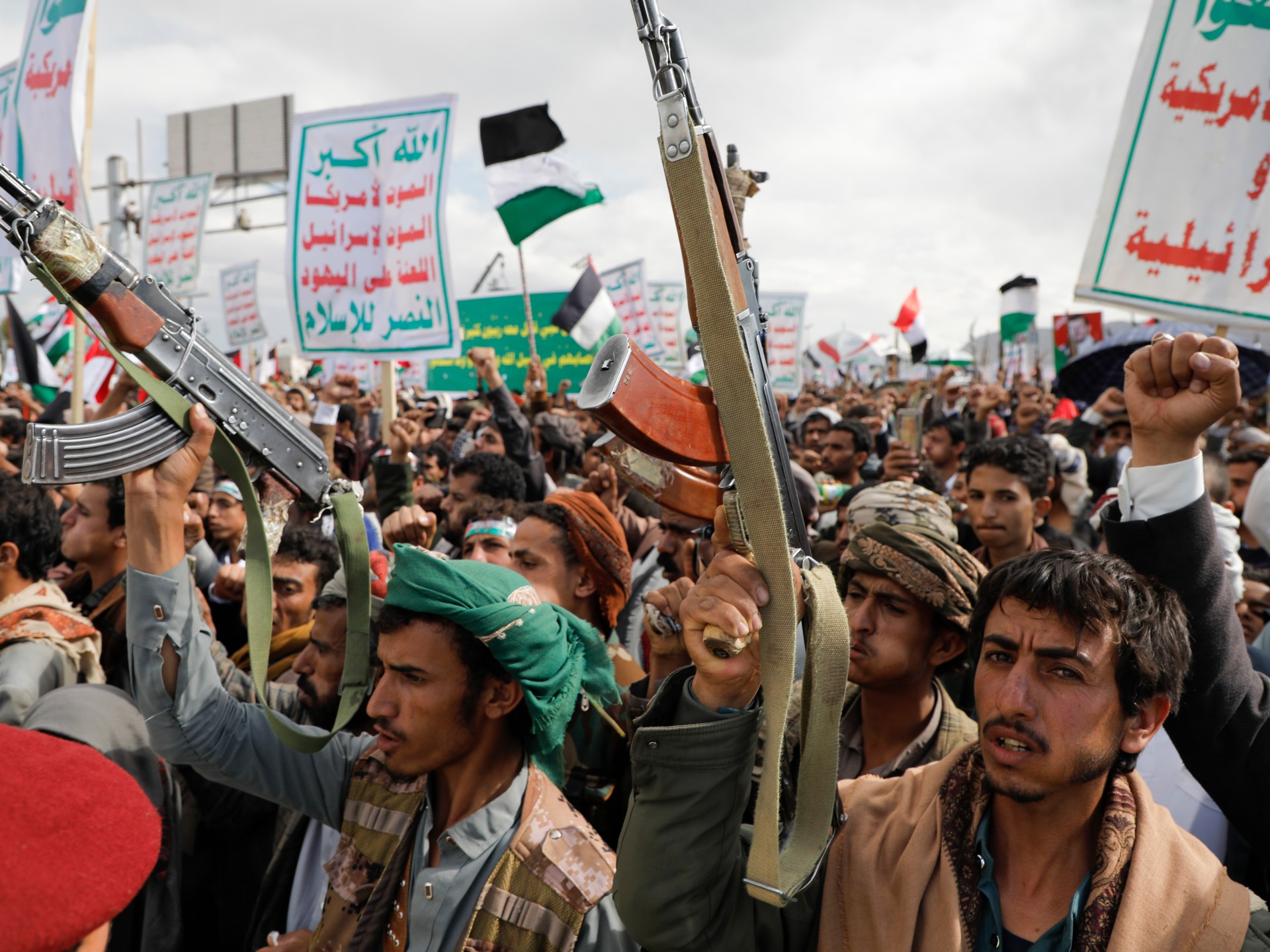Latest pressure campaign comes as US says peace plan cannot move forward if Red Sea attacks persist, Bloomberg reports.
The United States and its allies are increasingly seeking to block revenues to Yemen’s Houthi group, a push that could jeapordise United Nations-led efforts to end the civil war in the country, Bloomberg News has reported.
According to the report published on Thursday, Washington is looking to block major parts of a UN peace plan that the warring parties in Yemen adopted in December unless the Houthis cease their attacks on international shipping lanes.
The UN roadmap includes $1.5bn in civil servant salaries by Riyadh to be paid in Houthi-controlled areas, Bloomberg reported, citing an unidentified source.
An anonymous Department of State official confirmed Washington’s position to Bloomberg, while still saying the US supports peace in Yemen.
The Houthis have been attacking ships in the Red Sea and firing missiles and drones at Israeli targets in a show of support for Palestinians in Gaza, drawing anger from Washington.
The US and its allies have been bombing Houthi targets in Yemen since January, but the military campaign has not deterred Houthi attacks. The Houthis pledged to continue targeting Israel-linked ships as long as the war on Gaza, which has killed at least 36,654 Palestinians, goes on.
Most recently, on Thursday, the group said it targeted two vessels at Israel’s Haifa port.
Banks ordered closed in Houthi territory
In March 2015, Saudi Arabia led a regional military coalition that launched what would become a years-long offensive in support of the internationally recognised Yemeni government, against the Iran-allied Houthis who had taken over the Yemeni capital Sanaa.
The fighting, which set off a major humanitarian crisis had turned into a protracted conflict, with the Houthis staying in control in Sanaa and other major population centres, and the Saudi-backed government remaining in the southern city of Aden.
The warring parties agreed to a ceasefire in April 2022, which expired in October of that year. But the fighting has largely been paused amid diplomatic efforts to find a lasting resolution to the conflict, including the December UN roadmap.
The plan included the “implementation of a nationwide ceasefire, payment of public sector salaries, resuming oil exports, opening of roads in Taiz and other parts of Yemen” and the easing of remaining restrictions on Sanaa Airport and Hodeidah Port.
Still, tensions between the Houthis and the internationally recognised government have remained high, especially over economic issues. The US push to squeeze the Houthis’ finances risks exacerbating them further.
In January, the administration of President Joe Biden designated the Houthis as “global terrorists” over their Red Sea attacks, a move that enabled sweeping financial sanctions against the group.
The latest US effort comes as the Central Bank of Yemen, which remains under the Saudi-backed government’s control, moved to suspend operations at banks in Houthi-controlled areas, including Sanaa, according to Bloomberg.
The central bank’s governor cited failure to comply with orders for all financial institutions to move their headquarters to Aden.
The action is expected to stifle Houthi access to foreign currency and dry up the liquidity of the group. It was done with the support of the US and Western allies, Bloomberg reported, citing four people with direct knowledge of the situation.
Houthi leader Abdul Malik al-Houthi had called the move against Sanaa-based banks an “American effort for the benefit of Israel”, adding that the US is trying to “implicate” Saudi Arabia with that effort.
“It’s a dangerous game – a game of adding fuel to the fire,” Al-Houthi said last month.
The office of the UN’s special office to Yemen, led by Hans Grundberg, has repeatedly said the Houthi Red Sea attacks and “related international military responses in Yemen” threaten the fragile truce in Yemen.
After years of war, Yemen continues to face one of the world’s worst humanitarian crises, according to the UN, with more than 18 million people in need of aid and more than 17 million food insecure. About 4.5 million people in the country remain displaced.
Meanwhile, stop-start payments of public sector salaries have hastened the collapse of healthcare, sanitation, water and education services, according to the UN.
Check out our Latest News and Follow us at Facebook
Original Source

